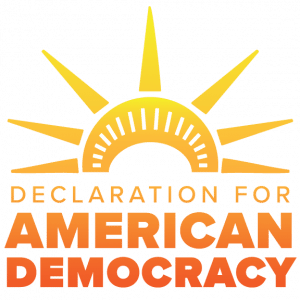This Week in 200 Words
This week in state updates, a Native American voting rights case over North Dakota’s photo ID law is headed to court. Michigan activists are rallying to oppose Republican efforts to roll back the independent redistricting and government ethics reforms that were approved by voters last year. Missouri is gearing up for a similar fight against the rollback of its own anti-gerrymandering measure. San Francisco’s “sunlight on dark money” initiative is also at risk of being gutted, but California state legislators are considering another proposal to ban political contributions from corporate utilities. And Georgia has become the latest state to push to restore voting rights for its formerly incarcerated residents.
In other news, the DC Statehood bill successfully cleared a House committee this week and is expected to pass in the House. The House also passed a bipartisan bill to strengthen ethics during presidential transitions. Congress heard from FEC commissioners on a possible bid to overturn Citizens United. And Senate Republicans blocked 3 election security bills from a vote on the floor.
National News
Washington Post – D.C. statehood bill advances to House floor; likely to pass for first time in history
A divided House committee on Tuesday advanced a D.C. statehood bill to the floor for the first time in nearly three decades, bringing advocates closer to their goal of making the nation’s capital the 51st state.
The bill has a good chance of passing the House of Representatives, because Democrats have a solid majority and the cause of statehood has become a darling of Democratic leaders, national civil rights groups and presidential candidates.
But it faces almost certain death in the Republican-controlled U.S. Senate.
“It is fitting that this historic vote happened in the midst of Black History Month, for I dare say — achieving D.C. statehood would be black history,” Mayor Muriel E. Bowser said in a statement.
Government Executive – House Passes Bipartisan Bill to Strengthen Presidential Transition Team Ethics Requirements
The House on Wednesday passed by voice vote a bipartisan bill to clarify the General Services Administration’s responsibilities during changes in presidential administrations as well as require presidential candidates to publicly release ethics plans for their transitions before the election.
The “2019 Presidential Transition Enhancement Act,” (S. 394), which the Senate passed by unanimous consent in August, would amend the 1963 Presidential Transition Act to improve the transfer of executive power between administrations. If President Trump signs the bill into law, GSA, presidential transition teams and federal agencies will have new obligations in the lead-up to Election Day and during the ensuing change in administrations.
WhoWhatWhy – Congress (Finally) Considers Bid to Overturn Citizens United
Democratic lawmakers on the House Judiciary Committee’s Subcommittee on the Constitution, Civil Rights, and Civil Liberties made the case during a hearing Thursday that Citizens United must be overturned, while the panel’s Republicans praised the ruling as a way for Americans to pool their resources and have a greater voice.
[…] Ellen Weintraub, a commissioner on the Federal Election Commission (FEC), offered the committee a number of steps that Congress could immediately take to stop the bombardment of cash in US elections. These include extending the ban on foreign-national contributions to ballot measures and reforming the financing of inaugural committees. HR 1, known as the For the People Act, has been waiting for a vote in the Senate for one year. That bill imposes stronger disclosure requirements about donors from super PACs, and establishes publicly funded campaigns.
The Fulcrum – Senate blocks election security bills pushed with Trump in mind
Democrats on Tuesday afternoon called up three of their top-priority election security bills they view as the least controversial, asking the Senate to pass them immediately on voice votes. Each time they were blocked by a single Republican, who under the rules could prevent further action.
The choreographed standoff underscores how the politically divided Congress is on course to do nothing more before Election Day to address perhaps the single the most pressing challenge to democracy: foreign adversaries armed with disinformation campaigns and hacking skills wresting control of a presidential contest away from the voters.
State Updates
KFYR TV – Native American voting rights case over ID law to proceed
A voting rights case over North Dakota’s photo ID law will proceed. A federal judge has denied a motion to dismiss from Secretary of State Al Jaeger, the defendant in the case.
The Spirit Lake Tribe, the Standing Rock Sioux tribe, and some individual tribal members filed the lawsuit the week before the 2018 election.
They said because of some of the issues with getting addresses on the reservation, the law made it harder for Native Americans to vote.
In his ruling, District Court Judge Daniel Hovland agreed, saying the tribes have had to use significant resources to make sure tribal members can vote. Hovland says the law also places some burden on the individual plaintiffs. He also said Jaeger failed to dispute the plaintiff’s claim there was intentional discrimination against Native Americans on the part of the legislature.
Michigan – The Fulcrum – Democracy groups rally to defend independent redistricting in Michigan
A coalition of democracy reform groups is rallying in opposition to a lawsuit seeking to block Michigan from moving forward with a voter-approved independent redistricting commission.
The commission was approved as part of a 2018 ballot measure that transferred the power of drawing congressional and legislative districts from lawmakers to a 13-member body consisting of four Democrats, Republicans and five unaffiliated members.
The measure, which was championed by Voters Not Politicians, was in response to the state’s practice of drawing once-a-decade voting lines that favored the party in power, a practice known as partisan gerrymandering.
Two lawsuits filed last year have challenged the legality of the redistricting commission, including one by the Michigan Republican Party, which argues the measure’s eligibility restrictions that block politically connected individuals, such as politicians, lobbyists and legislative staffers, from serving on the commission are a violation of their free speech and equal protection rights.
The Kansas City Star – Clean Missouri gears up to fight Senate move against voter-approved redistricting
With Republican-led redistricting changes headed back to Missouri voters, efforts to defeat the proposal at the ballot box have already begun.
The legislative proposal cleared a major hurdle Monday night when the Missouri Senate passed its version of redistricting reforms that would roll back changes made through the 2018 Clean Missouri ballot initiative. If it passes the House also, voters would once again decide on a new method to draw maps.
San Francisco Chronicle – Free speech or dark money disclosure: Political operatives seek to gut SF campaign ad measure
A handful of prominent San Francisco political operatives are seeking to gut a ballot measure voters overwhelmingly passed last year that pulls back the curtain on who’s paying for campaign advertisements.
In a federal lawsuit filed last week, a group sued the city to neuter the key provisions of Proposition F, which its supporters named the “Sunlight on Dark Money Initiative.” Prop. F, which passed with 77% of the vote and took effect in December, forces political campaigns to disclose their top three contributors of $5,000 or more in their advertising materials, along with exactly how much they gave. That threshold was previously $10,000.
Atlanta Journal Constitution – Activists gather to push to restore Georgia felons’ voting rights
Activists gathered Tuesday to call for lawmakers to restore voting rights and expand expungement for convicted felons.
“We have to remember that voting is a right. It is not a privilege, it is something we are all born with,” said John Paul Taylor, field director of the Southern Poverty Law Center, a nonprofit legal advocacy group.
Under Georgia law, people convicted of crimes of “moral turpitude” cannot vote until they have finished their parole or probation and paid off fines after their sentences end. The law doesn’t describe what “moral turpitude” is, so all convicted felons have to abide by these requirements.State Sen. Harold Jones, D-Augusta, spoke at the event about Senate Bill 11, which would define moral turpitude and restore voting rights for people convicted of some nonviolent felonies after they completed their prison sentences.
ABC10 – PG&E pushback: New California bill would ban utilities from making political donations
California state lawmakers will consider banning PG&E and other corporate utilities from making campaign contributions under a bill being introduced Wednesday by Assembly member Kevin Kiley (R-Rocklin.)
PG&E is bankrupt, serving time on probation for six federal felonies, named as the cause of disasters that have killed 117 people, and under criticism for mishandling widespread blackouts that were intended to (but may not have) prevent more fires.
The company, which holds a government-backed monopoly over 16 million people, also charges rates that are double the national average.
“This was, above all, a political failure,” Kiley said on ABC10’s Morning Blend Wednesday. “As PG&E now seeks to emerge from bankruptcy, the most important restructuring is to loosen its grip on the state Capitol.”
ABC10’s investigation of the issue found that political organizations and candidates accepted more than $4 million in donations from PG&E in the 2018 election cycle, despite the fact that the company had recently been convicted of six federal felonies.

